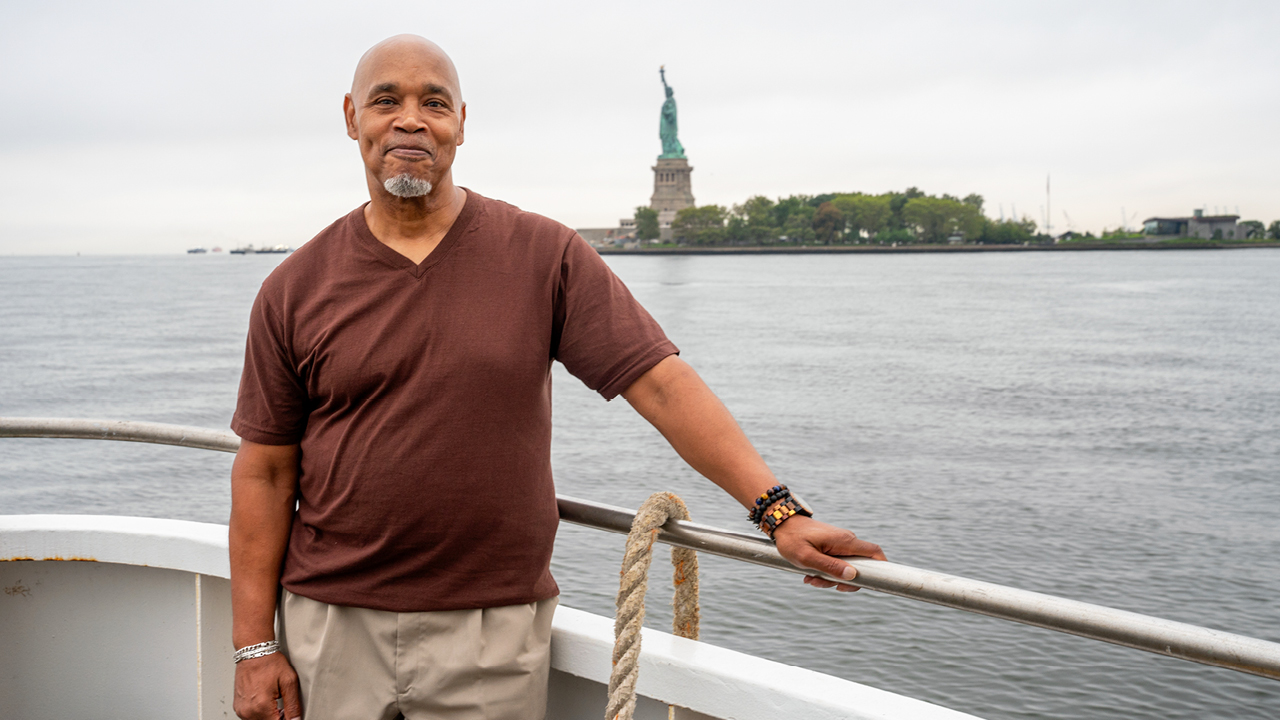Veteran Pays It Forward After Substance Misuse Treatment
4-minute read
Veteran Pays It Forward After Substance Misuse Treatment
4-minute read
Kevin had already been through so much in his life after serving four years in the U.S. Army. The constant ringing in his ears. The 20 years of drug misuse. The years of homelessness and hopelessness.
And then the detox, residential rehab and cognitive behavioral therapy that finally gave him back his life.
After all of that, Kevin felt he still had one more step to take.
“I yearned to do something more,” Kevin says. “How can I help the Veterans? How can I help my fellow sisters and brothers?” Kevin earned his certification as a peer specialist in the state of New York and then got hired by VA to support patients with substance use disorder or other mental health challenges.

“It’s never too late.” Veteran’s Recovery Leads Him to New Purpose
“I would never want another Veteran to go through what I went through out there. If I can circumvent that journey somewhere along the line to help them, I do it,” Kevin says.
Kevin believes he’s in a special position to connect with and positively influence the Veterans he supports because, unlike VA clinicians, peer specialists can share their personal backgrounds. “I can tell my story,” he says. “I let it flow, and it hits them because there’s a trust factor that’s initiated immediately.”
Kevin’s story
Kevin served in the Army from 1979 to 1983. Serving with an air defense artillery unit during his deployment in Germany, he was frequently exposed to the noise of firing missiles, which he believes contributed to his development of tinnitus.
People with tinnitus experience a constant ringing or buzzing sound in their ears. For Kevin, the ringing felt overwhelming. He started using substances in an attempt to cope.
“I started drinking and doing pot,” Kevin recounts. “Pot led to the cocaine, and cocaine led to smoking it. There was some bouts of heroin involved also.”
Kevin discovered that his drug misuse didn’t do anything to alleviate the ringing, but by then he felt that he couldn’t stop. His life spiraled downward to the point where he spent several years homeless and cut off communications with his immediate family. “I was totally lost,” he says, and his misuse of drugs continued for more than 20 years.
However, Kevin’s wife never gave up on him, and that inspired Kevin to seek help at a detox center. During his detoxification, he met a counselor who was a sergeant in the Army and who pressed Kevin to reach out to VA for treatment.
Kevin entered a 28-day residential treatment program for substance use disorder, which became his turning point. He started to learn about coping skills, and counselors in the program encouraged him to continue his treatment with the VA Hudson Valley Healthcare System in Montrose, New York.
“It was one of the best things as far as on my road to recovery that I could have done,” Kevin says of his entry into Hudson Valley’s substance use treatment program. The skills he learned from cognitive behavioral therapy were among the biggest game-changers, he says.
“The way you think has a lot to do with the way you feel, and the way you feel has a lot to do with your behavior,” Kevin explains.
Kevin keeps himself on the right track by continuing his therapy, taking frequent walks, writing daily in a journal to hold himself accountable, turning to his wife for support and wisdom and calling his Narcotics Anonymous sponsor every other day.
His recovery enabled him to reconnect with his family, including five sisters, two brothers, and nieces and nephews. He also went back to work. After his initial treatment and recovery, Kevin was hired by Hudson Valley Healthcare System, first in housekeeping services and then in medical records, where he made use of the skills he learned as an Army personnel administration specialist.
At that point, he decided to take courses to become a peer specialist. Peer specialists are people who have a lived experience with substance use disorder or a serious mental illness, are in ongoing recovery, and have received training on how to provide support and guidance to people with similar challenges.
Now working as a peer specialist at a VA health care facility, Kevin facilitates support groups for substance use and mental health patients. He also meets with patients individually, offering suggestions, advice and encouragement. “I let them know, we are one,” Kevin says. “We are the same. We need help. We got to get it.”
“I didn’t get clean until I was 54, so it’s never too late,” Kevin says. “You can still be productive.”

